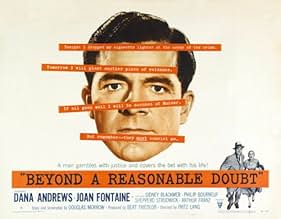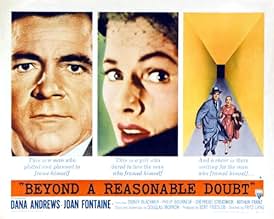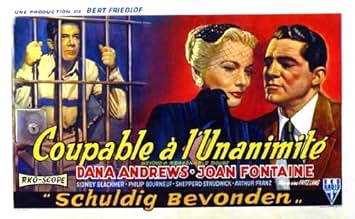NOTE IMDb
6,9/10
6,3 k
MA NOTE
Un romancier aidé par son futur beau-père conspire à se faire passer pour le meurtrier d'un danseuse burlesque dans le cadre d'un effort pour interdire la peine de mort.Un romancier aidé par son futur beau-père conspire à se faire passer pour le meurtrier d'un danseuse burlesque dans le cadre d'un effort pour interdire la peine de mort.Un romancier aidé par son futur beau-père conspire à se faire passer pour le meurtrier d'un danseuse burlesque dans le cadre d'un effort pour interdire la peine de mort.
- Réalisation
- Scénario
- Casting principal
- Récompenses
- 1 nomination au total
William F. Leicester
- Charlie Miller
- (as William Lester)
Avis à la une
... and I highly recommend it. The implausible plot has a few large potholes and implausible events but it has a heck of an ending. It is clever enough to be entertaining while being complete and utter glossy trash. They couldn't possibly believe this film made any points against capital punishment.
Barbara Nichols is priceless as always.
Barbara Nichols is priceless as always.
Sometimes, in the world of 1940s-1950s film noir, we are given a film so transparently impossible and contrived that we can see ourselves giving up on watching it half way through. But is extremely rare that we are faced with a film where the very response the viewer is having holds the key to the success, rather than the failure, of the film.
Such is the case with BEYOND A REASONABLE DOUBT, which has - to its credit - been completely misunderstood by many. When we reach the film's conclusion, we realize that even the title of the film itself is a joke, perhaps the ultimate prank on the viewer. Yet to offer analysis of the film would be to destroy its main and most sinister motive; you can't "explain away" the glaring plot holes and contrivances without revealing the twist the film takes in its climax, and to do would rob the viewer of a genuine experience. So... I won't.
Suffice it to say, BEYOND A REASONABLE DOUBT is far more than it seems and is nothing without the sum of its parts, in total. Lang tackles the story of a person who creates a fictitious role for himself in order to, essentially, pull a fast one on the legal profession for personal gain (or, as it appears on the surface, someone else's). In the world of film noir, of course, we know that such a character won't get away with it, but when Lang depicts the tragedy the viewer knows will come, he majestically turns the entire premise on its head. As a result, it's a cold slap in the face - a devastating critique of the complicity of the audience in following along, hungrily, with such contrivances in cinema.
Every part of the film fits perfectly by not fitting at all. Even the visual style of the film is a cold, rarely pleasing one, almost daring you to suspend your disbelief just a little bit longer without even granting the pleasure of emotionally charged close-ups at key moments. The editing is brutal and jarring, cutting away practically mid-sentence and moving to a similar conversation elsewhere.
As a swan song to his Hollywood career, BEYOND A REASONABLE DOUBT does to the audience what Billy Wilder does to the industry in SUNSET BLVD. - biting the hand that feeds. The result is a total masterpiece.
Such is the case with BEYOND A REASONABLE DOUBT, which has - to its credit - been completely misunderstood by many. When we reach the film's conclusion, we realize that even the title of the film itself is a joke, perhaps the ultimate prank on the viewer. Yet to offer analysis of the film would be to destroy its main and most sinister motive; you can't "explain away" the glaring plot holes and contrivances without revealing the twist the film takes in its climax, and to do would rob the viewer of a genuine experience. So... I won't.
Suffice it to say, BEYOND A REASONABLE DOUBT is far more than it seems and is nothing without the sum of its parts, in total. Lang tackles the story of a person who creates a fictitious role for himself in order to, essentially, pull a fast one on the legal profession for personal gain (or, as it appears on the surface, someone else's). In the world of film noir, of course, we know that such a character won't get away with it, but when Lang depicts the tragedy the viewer knows will come, he majestically turns the entire premise on its head. As a result, it's a cold slap in the face - a devastating critique of the complicity of the audience in following along, hungrily, with such contrivances in cinema.
Every part of the film fits perfectly by not fitting at all. Even the visual style of the film is a cold, rarely pleasing one, almost daring you to suspend your disbelief just a little bit longer without even granting the pleasure of emotionally charged close-ups at key moments. The editing is brutal and jarring, cutting away practically mid-sentence and moving to a similar conversation elsewhere.
As a swan song to his Hollywood career, BEYOND A REASONABLE DOUBT does to the audience what Billy Wilder does to the industry in SUNSET BLVD. - biting the hand that feeds. The result is a total masterpiece.
While Sidney Blackmer and Dana Andrews cook up and carry out their scheme to prove that an innocent person can be convicted of a murder, everyone ignores the fact that, by getting this innocent person convicted, they're helping the real murderer escape justice. Just sayin'.
"Beyond a Reasonable Doubt" is a curious film - it has the look and feel of a B movie and two stars who had seen better days - Dana Andrews and Joan Fontaine - yet it's a good script directed by Fritz Lang. A novelist (Andrews) and his future father-in-law, a newspaper magnet (Sidney Blackmer) work together to prove that the death penalty isn't justified by framing Andrews for a recent murder.
I thought the story excellent with some exciting twists, though the whole movie has an underplayed (not to mention inexpensive) feeling to it. Fontaine seemed a little old for her role. However, she does a good job as a sophisticate, and Andrews is good as well. Barbara Nichols does a fine job in a typical supporting role for her.
Lang returned to Germany after this film, his last in America. It's an effective plot but one wishes the man who made Metropolis and so many other fine films was given more of a budget for his swansong.
I thought the story excellent with some exciting twists, though the whole movie has an underplayed (not to mention inexpensive) feeling to it. Fontaine seemed a little old for her role. However, she does a good job as a sophisticate, and Andrews is good as well. Barbara Nichols does a fine job in a typical supporting role for her.
Lang returned to Germany after this film, his last in America. It's an effective plot but one wishes the man who made Metropolis and so many other fine films was given more of a budget for his swansong.
In his last film in the USA before returning to Germany where he had left to escape the Nazis in the Thirties, Fritz Lang takes up the case of capital punishment and its application, especially when the case is a circumstantial one.
Unlike the remake of Beyond A Reasonable Doubt with Jesse Metcalfe as the reporter and Michael Douglas as a corrupt District Attorney, both Sidney Blackmer as a newspaper publisher and Sheppard Strudwick as the politically ambitious DA hold each other in respect. Blackmer is not happy with Strudwick running up a string of murder convictions as a platform to be governor.
He and prospective son-in-law Dana Andrews agree to frame Andrews with a string of manufactured evidence all carefully documented with photographs to have the police arrest him for murder of a burlesque queen that the police are stumped about. It certainly works all right, but as the case is coming to verdict, Blackmer is killed in an automobile accident and the evidence burn with him. Andrews is left in quite the jackpot.
How it all works out is for you to see. Andrews is not abandoned by fiancé Joan Fontaine who is Blackmer's daughter. She does what she can and toward the end of the film her performance dominates.
Fritz Lang certainly builds the tension worthy of Alfred Hitchcock himself. One scene did have me baffled. After the police have gotten those arranged clues, Andrews makes some moves on burlesque dancer Barbara Nichols who resists his advances. I could not quite believe that one at all.
This original version is a notch or two above the Metcalfe/Douglas remake. Though it got an interesting alternative remake, this is still the one to see.
Unlike the remake of Beyond A Reasonable Doubt with Jesse Metcalfe as the reporter and Michael Douglas as a corrupt District Attorney, both Sidney Blackmer as a newspaper publisher and Sheppard Strudwick as the politically ambitious DA hold each other in respect. Blackmer is not happy with Strudwick running up a string of murder convictions as a platform to be governor.
He and prospective son-in-law Dana Andrews agree to frame Andrews with a string of manufactured evidence all carefully documented with photographs to have the police arrest him for murder of a burlesque queen that the police are stumped about. It certainly works all right, but as the case is coming to verdict, Blackmer is killed in an automobile accident and the evidence burn with him. Andrews is left in quite the jackpot.
How it all works out is for you to see. Andrews is not abandoned by fiancé Joan Fontaine who is Blackmer's daughter. She does what she can and toward the end of the film her performance dominates.
Fritz Lang certainly builds the tension worthy of Alfred Hitchcock himself. One scene did have me baffled. After the police have gotten those arranged clues, Andrews makes some moves on burlesque dancer Barbara Nichols who resists his advances. I could not quite believe that one at all.
This original version is a notch or two above the Metcalfe/Douglas remake. Though it got an interesting alternative remake, this is still the one to see.
Le saviez-vous
- AnecdotesFinal American film made by Fritz Lang before returning to Germany. It was a box-office failure.
- GaffesWHile the trial is shown on TV there is a frontal shot of Tom sitting at the defendants desk. This would not be possible as the television camera was stationed behind and to the side of the desk. It's not feasible that the large 1950's era television camera would have been moved to the front of the courtroom for the shot.
- Citations
Tom Garrett: Well, could I get in touch with you?
Dolly Moore: You've touched enough already!
- ConnexionsFeatured in Propriété privée (1960)
- Bandes originalesBeyond A Reasonable Doubt
Sung by The Hi-Los (as The Hi-Lo's)
Music by Herschel Burke Gilbert
Lyrics by Alfred Perry
Meilleurs choix
Connectez-vous pour évaluer et suivre la liste de favoris afin de recevoir des recommandations personnalisées
- How long is Beyond a Reasonable Doubt?Alimenté par Alexa
Détails
- Date de sortie
- Pays d’origine
- Langue
- Aussi connu sous le nom de
- Invraisemblable vérité
- Lieux de tournage
- Chicago, Illinois, États-Unis(location shooting)
- Société de production
- Voir plus de crédits d'entreprise sur IMDbPro
- Durée
- 1h 20min(80 min)
- Couleur
Contribuer à cette page
Suggérer une modification ou ajouter du contenu manquant

























